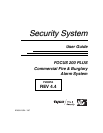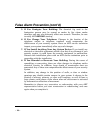
– 7 –
False Alarm Prevention
Introduction
In recent years the pace of electronic development of security systems has
greatly accelerated. This has brought the price range of reliable monitored
security systems to a level that is affordable to most households and nearly
all businesses. As a result, the number of security systems installed is
expanding swiftly.
Since these security systems are a most significant deterrent to unwanted
intrusion, structures protected by security systems are generally safer than
those without; this is a benefit to both the residents and the local law
enforcement.
However, from time to time, many security system users operate their
system improperly and an alarm signal is generated in error. This situation
is referred to as a “false alarm.”
When a security system monitoring center receives an alarm signal, your
local police and/or fire department will be advised that there is an emergency
at your location requiring their timely response. Even if each user has only
one false alarm every two years, the police could potentially be called upon to
respond to nearly ten million false alarms each year. In most cities, more
than 90 percent of all alarms reported to the police are FALSE! In many
cities, the police spend as much as 15 percent of their time and resources on
false alarm-generated “wild goose chases.” In turn, this:
• Diverts police and/or fire department personnel from legitimate calls.
• Puts the community members at unnecessary risk.
• Wastes taxpayers' money.
• Embarrasses the security system user.
• Diverts and wastes security company resources.


















